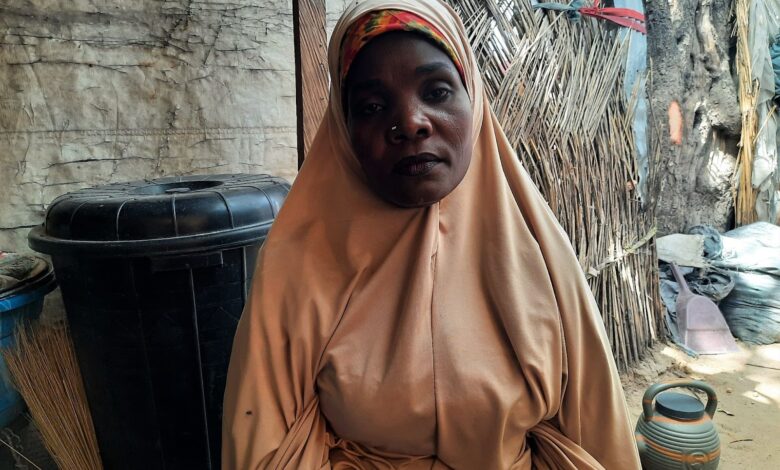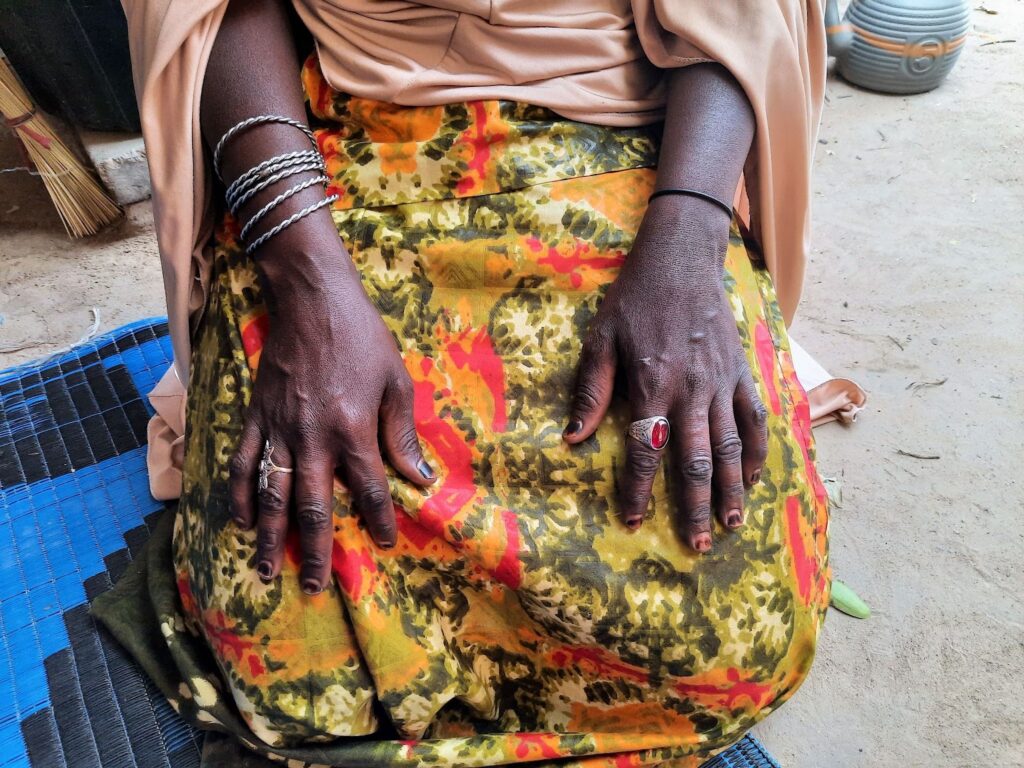‘We Wouldn’t Suffer As Much If My Husband Were Here’
After their family became displaced, Halimah’s husband had travelled to prepare a new home for them in a relatively safer part of Nigeria. That was over seven years ago. Halimah is still waiting for him.

Bukar Mandara, 50, loved eating tuwon dawa and draw soup. He loved to wear white and green kaftans. Above all, he loved his wife. It’s why, even though he’s been gone without a trace for over seven years, Halimah Abba has refused to promise herself to another man.
The couple’s predicament started with the spread of the Boko Haram insurgency from Maiduguri, the capital of Nigeria’s northeastern state of Borno, to other parts of the region. In 2014, roughly a year before it was declared the world’s deadliest terrorist organisation, the group had embarked on a vicious campaign of territorial expansion, capturing town after town and imposing its extreme interpretation of Islamic laws.
One of the areas that fell under its control was Bama, where Bukar and Halimah hail from. They had lived in Nguro Soye, a small community that cuddles the Bama-Maiduguri highway and is about two hours drive from the state capital.
Sometime in 2015 when they could no longer bear with the disruption in their lives and constant threat to their safety, the couple and other families decided it was best to leave town. The women took their most important belongings and travelled on foot with the children. They planned that the men would follow right after sunset.
“We left the men behind because Boko Haram would not allow them to leave if they saw them,” Halimah, 35, explains.
The women did not have a hitch-free experience either. When they got to Ngawulimari, the insurgents caught and arrested them for trying to escape. Since it was night time, Halimah managed to sneak out of the house they were kept in after their husbands arrived as agreed. She advised Bukar to leave immediately for Kolofata, a town in Cameroon that’s about 10 km from the border with Nigeria. For someone who is trekking, it is half a day’s journey from Nguro Soye.
Thanks to relentless appeal from a village elder, the insurgents released the women a week after their arrest and permitted them to leave for Kolofata.
Halimah narrates that she stayed with her husband in Sharwuri, a community close to Kolofata, for a week. Then Bukar decided to leave for Yola, the capital of Adamawa, a state that shares borders with the south of Borno and the west of Cameroon. He had planned to prepare the grounds for his family to eventually join him.
Bukar did make it to Yola and he did call to say he had started searching for a house they could stay in. But that was the last time Halimahーor anyone else, as far as she can tellーheard from him.
His younger brother went to Yola to search for him, though without luck, while the rest of the family proceeded to a displacement camp in Mokol, Cameroon.
“We think he might be in detention,” Halimah says.
There are tens of thousands of people who have gone missing in Nigeria, most of them as a result of the Boko Haram insurgency. The International Committee of the Red Cross (ICRC) says it has documented at least 24,000 of such cases. This is more than half the number of people recorded as missing across Africa. Yet, the ICRC recently assured, the figure “is only the tip of the iceberg and the full scale of the humanitarian fallout in Nigeria remains largely unknown”.
One of the commonest causes is arbitrary arrests by the military of people faintly suspected of being terrorists or supporting the insurgent groups. The international research and advocacy group, Amnesty International, noted in a 2016 report that after the Nigerian army regained control of places occupied by Boko Haram in 2015, it arrested hundreds of young men, especially people fleeing from communities in Banki and Bama.
Based on witness testimonies, the group found that the “arrests were arbitrary, largely based on random profiling of men, especially young men, rather than on reasonable suspicion of having committed a criminal offence”.
While Halimah is not sure what happened to Bukar, she knows exactly how Alhaji Aisami went missing. Aisami, her brother’s son who was 25 years old, was a commercial driver who plied the route between Banki and Bama. About a week after his mom, Ya Dulo, died, members of the Civilian Joint Task Force (CJTF), a militia working with the Nigerian military to fight terrorists, picked him up.
“And we have not seen him since then; it has been about 10 years now.”

Bukar is a tall man with fair skin. He has tribal marks and his speech comes in bold fonts. He and Halimah, who is his second wife, have been married for over 20 years. They had first met during one of his visits to his uncle, who happened to be Halimah’s neighbour back in Nguro Soye.
Halimah describes their marriage as ‘lively’. Bukar was both a driver and dry-season farmer. When he wasn’t working, he would power the petrol generator at their house and then the couple would watch movies.
They have seven children together, but one fell sick and died at the tender age of eight. The responsibility of keeping the rest alive and in good form rests now on Halimah’s shoulders. It has not been easy.
“We used to get food assistance from the World Food Programme (WFP) but they no longer give us,” she says. “I now depend on sewing caps to take care of the children.”
Since the Borno state government placed a ban on the distribution of aid to IDPs by humanitarian organisations last year, food shortages have worsened at the camps. This has caused more women to engage in survival sex and has forced many displaced people to migrate to areas controlled by non-state armed groups, or at least consider doing so. Accounts indicate that increasingly more people are starving to death.
The government is pushing for the displacement camps in Maiduguri to be shut down as IDPs are relocated to their local government areas of origin. But those at some of the resettlement sites have complained of hunger, water shortages, terror attacks, and a loss of livelihood.
Without aid from non-governmental organisations, displaced people fall back on cap-sewing, fetching firewood at the outskirts of Maiduguri where terrorists are known to lurk, or begging for almsーanother activity that has been prohibited by the state authorities.
Asides attending Qur’anic school, Halimah’s 18-year-old son helps with sewing caps alongside his sister who is older by two years.
“We make ₦6,000 to ₦8,000 per cap,” the mother says. “I also do house work from which I get ₦3,000 and, sometimes, we get some food from occasions.”
If Bukar were around, she adds, they would not be struggling this hard to make a living and fend for themselves. “He cared for us and provided everything we needed; food, clothing, and even cosmetics.”
For her, that is one of his greatest attributes. Till now, whenever she sees something she would love to have, her thoughts go to her husband. ‘If he were around he would provide for me,’ she would imagine.
She always remembers Bukar. Sometimes, she says, to the point of needing drugs to get out of depression. She is especially sad that three of their daughters got married and he was not around to partake in the ceremonies.
“The kids are always asking about him and I tell them he will come back,” she says.
“ーI want the government to find my husband for me.”
This report was produced in partnership with the Open Society Initiative for West Africa (OSIWA) under the Missing Persons Register’s Population and Amplification Project.
Support Our Journalism
There are millions of ordinary people affected by conflict in Africa whose stories are missing in the mainstream media. HumAngle is determined to tell those challenging and under-reported stories, hoping that the people impacted by these conflicts will find the safety and security they deserve.
To ensure that we continue to provide public service coverage, we have a small favour to ask you. We want you to be part of our journalistic endeavour by contributing a token to us.
Your donation will further promote a robust, free, and independent media.
Donate HereStay Closer To The Stories That Matter




